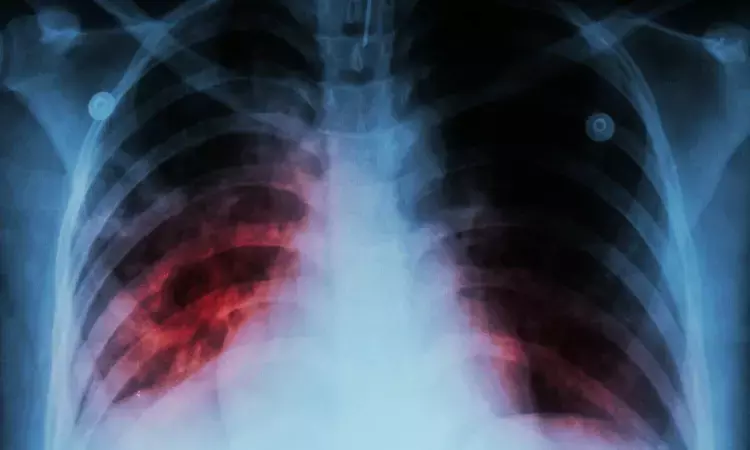- Home
- Medical news & Guidelines
- Anesthesiology
- Cardiology and CTVS
- Critical Care
- Dentistry
- Dermatology
- Diabetes and Endocrinology
- ENT
- Gastroenterology
- Medicine
- Nephrology
- Neurology
- Obstretics-Gynaecology
- Oncology
- Ophthalmology
- Orthopaedics
- Pediatrics-Neonatology
- Psychiatry
- Pulmonology
- Radiology
- Surgery
- Urology
- Laboratory Medicine
- Diet
- Nursing
- Paramedical
- Physiotherapy
- Health news
- Fact Check
- Bone Health Fact Check
- Brain Health Fact Check
- Cancer Related Fact Check
- Child Care Fact Check
- Dental and oral health fact check
- Diabetes and metabolic health fact check
- Diet and Nutrition Fact Check
- Eye and ENT Care Fact Check
- Fitness fact check
- Gut health fact check
- Heart health fact check
- Kidney health fact check
- Medical education fact check
- Men's health fact check
- Respiratory fact check
- Skin and hair care fact check
- Vaccine and Immunization fact check
- Women's health fact check
- AYUSH
- State News
- Andaman and Nicobar Islands
- Andhra Pradesh
- Arunachal Pradesh
- Assam
- Bihar
- Chandigarh
- Chattisgarh
- Dadra and Nagar Haveli
- Daman and Diu
- Delhi
- Goa
- Gujarat
- Haryana
- Himachal Pradesh
- Jammu & Kashmir
- Jharkhand
- Karnataka
- Kerala
- Ladakh
- Lakshadweep
- Madhya Pradesh
- Maharashtra
- Manipur
- Meghalaya
- Mizoram
- Nagaland
- Odisha
- Puducherry
- Punjab
- Rajasthan
- Sikkim
- Tamil Nadu
- Telangana
- Tripura
- Uttar Pradesh
- Uttrakhand
- West Bengal
- Medical Education
- Industry
Pamrevlumab Shows No Significant Benefit in Slowing Lung Function Decline in Idiopathic Pulmonary Fibrosis: JAMA

Researchers have found that pamrevlumab, a monoclonal antibody, does not significantly slow the decline in lung function for patients with idiopathic pulmonary fibrosis (IPF) compared to a placebo. This conclusion comes from a phase 3 randomized clinical trial aimed at assessing the efficacy and safety of pamrevlumab for treating IPF. The study was published in JAMA by Ganesh Raghu and colleagues.
Current treatments for idiopathic pulmonary fibrosis, such as nintedanib and pirfenidone, slow the progression of the disease but are often associated with adverse events that can affect medication adherence. Pamrevlumab, a fully human monoclonal antibody that inhibits connective tissue growth factor, showed promise in phase 2 trials by attenuating disease progression with minimal adverse effects. This phase 3 study aimed to evaluate its effectiveness and safety in a larger patient population.
The study included 356 patients aged 40 to 85 years with IPF who were not receiving nintedanib or pirfenidone at enrollment. Patients were recruited from 117 sites across 9 countries between July 18, 2019, and July 29, 2022. The last follow-up encounter occurred on August 28, 2023. Participants were randomized to receive either pamrevlumab (30 mg/kg intravenously every 3 weeks; n = 181) or a placebo (n = 175) for 48 weeks.
The primary outcome was the absolute change in forced vital capacity (FVC) from baseline to week 48. Secondary outcomes included time to disease progression (defined as a decline of ≥10% in predicted FVC or death), and exploratory outcomes encompassed patient-reported symptoms. Adverse events were also recorded.
Among the 356 patients (mean age, 70.5 years; 72.5% male; 62.1% White), 277 (77.8%) completed the trial. T
• The study found no significant difference in the primary outcome between the pamrevlumab and placebo groups.
• The least-squares mean change in FVC from baseline to week 48 was -260 mL (95% CI, -350 to -170 mL) in the pamrevlumab group versus -330 mL (95% CI, -430 to -230 mL) in the placebo group, resulting in a mean between-group difference of 70 mL (95% CI, -60 to 190 mL; P = .29).
• No significant difference in FVC change from baseline to week 48 between pamrevlumab and placebo groups (70 mL difference; 95% CI, -60 to 190 mL; P = .29).
• No significant differences between groups in any secondary outcomes.
• Treatment-related adverse events occurred in 88.4% of patients in the pamrevlumab group and 86.3% in the placebo group.
• Serious adverse events were reported in 28.2% of the pamrevlumab group and 34.3% of the placebo group.
• Mortality rates were similar, with 23 deaths in each group (12.7% vs. 13.1%).
Among patients with idiopathic pulmonary fibrosis, pamrevlumab did not result in a statistically significant difference in the primary outcome of FVC decline from baseline to week 48 compared to placebo. These results suggest that pamrevlumab may not offer additional benefits over existing treatments, underscoring the need for continued research into more effective therapies for IPF.
Reference:
Raghu, G., Richeldi, L., Fernández Pérez, E. R., De Salvo, M. C., Silva, R. S., Song, J. W., Ogura, T., Xu, Z. J., Belloli, E. A., Zhang, X., Seid, L. L., Poole, L., Bowler, S., Corte, T., Holmes, M., Thien, F., Wheatley, J., Choi, S.-M., Chung, M.-P., … ZEPHYRUS-1 Study Investigators. (2024). Pamrevlumab for idiopathic pulmonary fibrosis: The ZEPHYRUS-1 randomized clinical trial. JAMA: The Journal of the American Medical Association. https://doi.org/10.1001/jama.2024.8693
Dr Riya Dave has completed dentistry from Gujarat University in 2022. She is a dentist and accomplished medical and scientific writer known for her commitment to bridging the gap between clinical expertise and accessible healthcare information. She has been actively involved in writing blogs related to health and wellness.
Dr Kamal Kant Kohli-MBBS, DTCD- a chest specialist with more than 30 years of practice and a flair for writing clinical articles, Dr Kamal Kant Kohli joined Medical Dialogues as a Chief Editor of Medical News. Besides writing articles, as an editor, he proofreads and verifies all the medical content published on Medical Dialogues including those coming from journals, studies,medical conferences,guidelines etc. Email: drkohli@medicaldialogues.in. Contact no. 011-43720751


